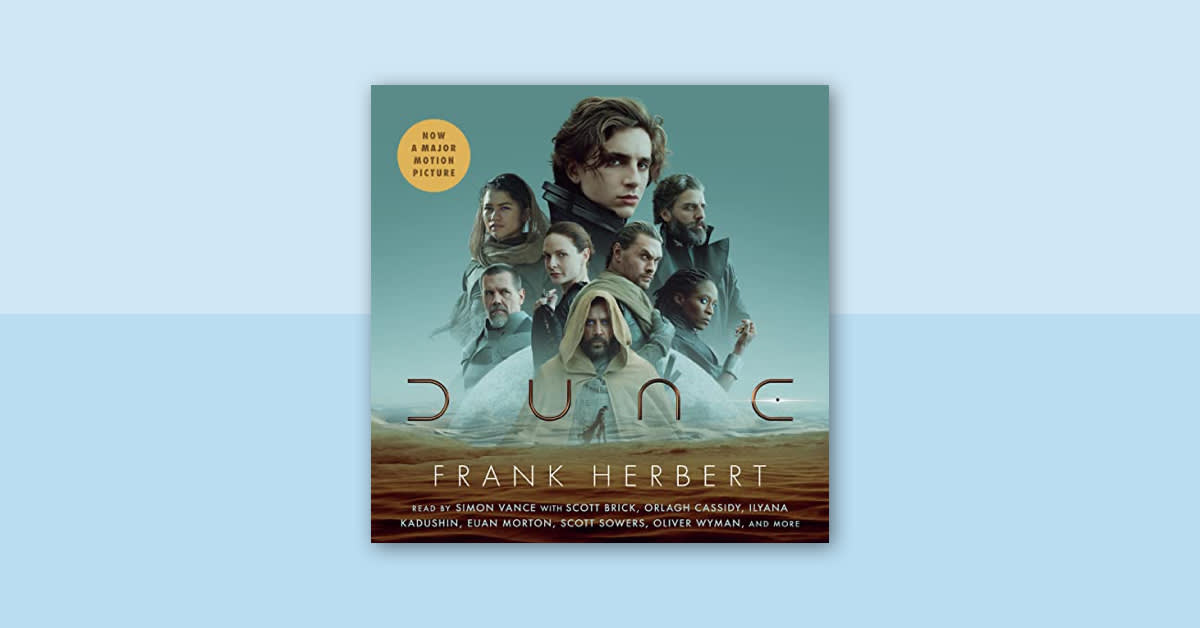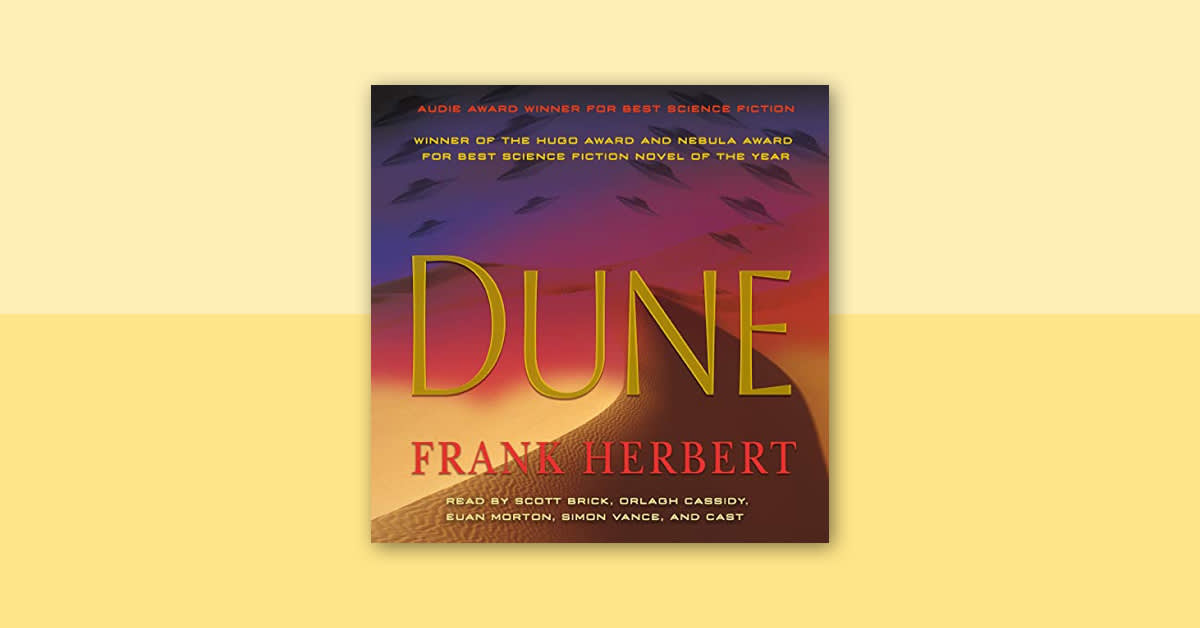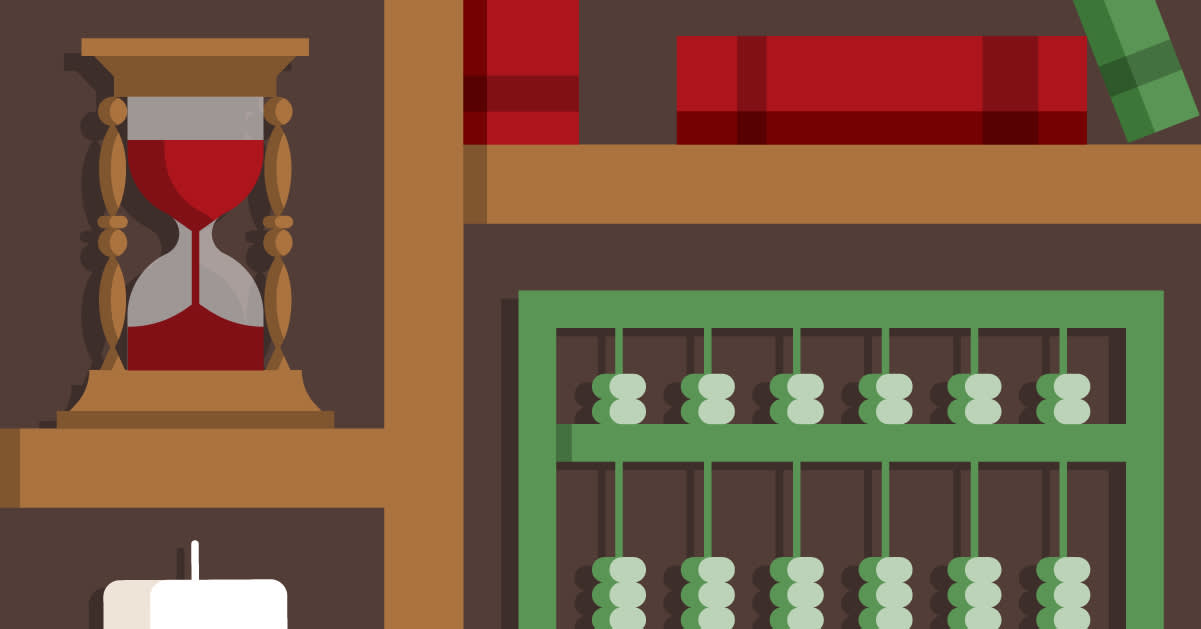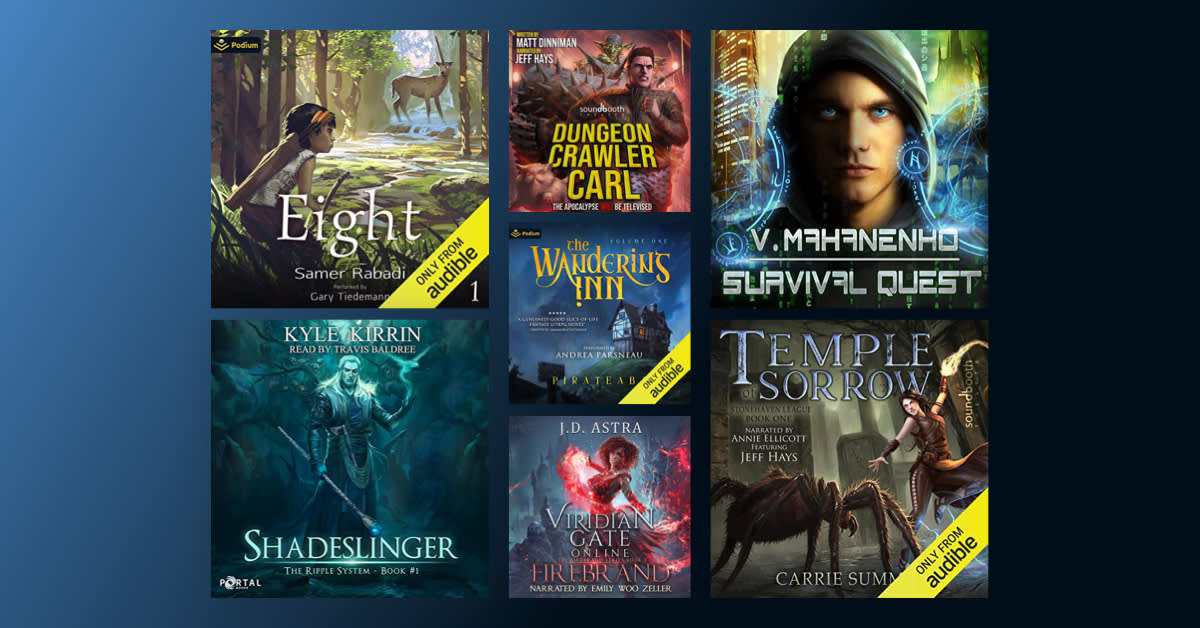This article was originally published on Audible.com.
The very first book to win the Nebula Award, Frank Herbert's Dune has long been a fixture of the sci-fi world. It's no surprise, then, that yet another filmmaker has taken a stab at bringing this classic to the screen. The latest effort, by Arrival and Blade Runner 2049 director Denis Villeneuve, captures the first half of the epic novel. The reviews have been generally positive, with critics and audiences blown away by the scale and sheer ambition of the adaptation. But just how faithful is the film to the book on which it was based?
Warning: The following article contains spoilers for Frank Herbert's Dune and the 2021 film adaptation.
What is Dune about?
Before we get into the nitty gritty, let's review the basic storyline. Dune follows Paul Atreides, the young son of Duke Leto and his concubine, Lady Jessica. From infancy, Paul has been trained to become a ruler, a fighter, and a master of formidable, transcendent powers. Jessica is a member of the Bene Gesserit, an order of women that exerts powerful political influence and possesses supernatural abilities, and she sees and nurtures Paul's potential. When Paul is 15, House Atreides is sent to take over management of Arrakis, a desert planet that is the source of the galaxy's essential trade in melange, or spice. As we learn alongside Paul, spice is the substance that allows interstellar travel, as well as granting its users strength, youth, and more. The former rulers, the Harkonnens, have not gone lightly and will do anything to get Arrakis back, and Paul will need all his training, and then some, to survive what they have planned. When violence erupts and claims his father, Paul and his mother must seek refuge with the native people of Arrakis, the Fremen, and learn how to survive in this harsh and demanding world.
Through the conflict between Houses Atreides and Harkonnen, Herbert weaves an immensely tangled story of politics, religion, and power. What are the lines between politics and religion? What does it mean to be a good ruler? Who has the right to access power and use it? Does the end justify the means? How can we live in harmony and cooperate with nature, rather than control it? These aren't new questions, but Herbert's take on them asks much more than it answers—and that's a lot for any film adaptation to tackle. (If you want a deeper dive into everything Dune, be sure to check out our explainer.)
How is the film Dune different from the book?
Villeneuve's Dune: Part One follows the Atreides family from their home planet of Caladan to Arrakis, and ends with Paul and Jessica finding sanctuary with the Fremen after fleeing violence and betrayal. And while a few characters are missing (most notably, Feyd-Rautha, the nephew and heir to the scheming Baron Harkonnen), the movie is remarkably faithful to its source material. Plot beat for plot beat, there are minimal alterations, and Villeneuve focuses both on smaller, more intimate plot points and the enormous, epic scale of the story. You'll see many reviewers talking about the majestic visuals, the overwhelming grandeur of the cinematography, the vastness of the settings. Villeneuve seeks to capture the scope and weight of Dune through the eye and the ear—in some moments, the score is so deeply intense that it has a nearly physical sensation.
In his book, Herbert takes us from one character to the next, letting us see who they are, who they love and hate, and what moves them. With a cast this size and a story this big, it's understandable that the depth of the relationships between characters, as well as individual character development, could not be as extensive as it is in the lengthy novel.
House Atreides
On screen, Oscar Isaac expertly channels Duke Leto's straightforwardness and love for his family—one of the most memorable and touching moments of character development is a conversation Paul has with his father about his fears for the future. While Isaac's Duke Leto is a bit cuddlier than he comes across in the book, his focus on making allies of the Fremen and caring for his staff and soldiers remains the same. His motivations are simple enough to portray: he wants to take care of his family; he wants to take care of his people; and he's open to expanding who counts as the latter. Lady Jessica, played by Rebecca Ferguson, is more difficult to gauge. We see her tutoring her son in a commanding voice in one scene, and weeping over her fears for him in another. We don't get much beyond a glimpse of her feelings towards the Duke—there's a brief tender moment of the couple in their bedchamber on Arrakis. Herbert's Jessica, on the other hand, is subtle but fierce, a lioness in socialite's clothing. In the movie, we see her superior berating her for bearing Leto a son, and accusing her of hubris. In the novel, however, we learn that she was moved as much by her love for Leto as by the chance to bear the Kwisatch Haderach.
Speaking of prophesied leaders... Timothée Chalamet's Paul Atreides is a bit more brooding and sullen, haunted by visions and beset by circumstances beyond his control, than Herbert's version. In the novel, Paul is sharp and watchful, occasionally playful, and constantly trying to get a read on what's going on around him—as he's been trained to do by his tutors and his mother. He's a teenager beset by outside forces, caught up in a whirlwind of politics and violence, always looking for a way to find his footing and seize his destiny.
Melange, or Spice
One of Villeneuve's bigger changes from Herbert's Dune is Paul's exposure to melange. While the Paul of the novel takes much longer to be exposed to the spice and experience its effects on his visions and his powers, the Paul of the movie is shown to be highly sensitive almost immediately, succumbing to hallucinations during a rescue mission, and is later affected by the ambient spice in the air of a tent. This change actually makes a lot of sense for the big screen; without the grounding of the book, it's hard to convey the importance and power of spice without seeing someone react to it—and Paul is the natural choice.
House Harkonnen
On to the Harkonnens! Baron Harkonnen is portrayed in all his over-the-top, evil-incarnate glory by Stellan Skarsgård, who certainly commits to being odious. (Meanwhile, former pro-wrestler Dave Bautista could play Beast Rabban in his sleep, so no problems there!) Villeneuve also offers an assortment of visual and audio cues to convey just how malevolent a force the Harkonnens are. Any scene involving the Harkonnens has the dimmest light and the blackest backdrop possible; they and their subordinates consistently speak in strident or snide tones; and the accompanying music has a decidedly sinister sound. The stark contrast between the Harkonnens and all other characters differs quite a bit from the book. Herbert went to great pains to complicate the ideas of good and evil, showing that even the more sympathetic Atreides family wasn't above acting purely for their own benefit. Power corrupts, no matter who you are—but as far as the movie is concerned, only the Harkonnens are corrupted.
As I've already noted, Harkonnen heir Feyd-Rautha has yet to show up on screen. We'll have to wait for the cast details of the recently announced second installment to see whether Villeneuve plans to drop him entirely, or is just keeping his appearance close to the vest.
Supporting Characters
In the film, we get only fleeting glimpses of the Bene Gesserit, Thufir Hawat, Gurney Halleck, Piter de Vries, the Shadout Mapes, Dr. Yueh, and Stilgar, all of whom are essential to the plot of Dune and much more developed in the book. Jason Momoa's Duncan Idaho gets more screen time, while Zendaya's Chani appears primarily in dreamy visions and to explain various important pieces of world-building or political context in voice-over narration. We'll likely see a lot more of her in Dune: Part Two.
Among minor characters, a major change from the book is the gender of Liet Kynes. Portrayed by Sharon Duncan-Brewster, the film version of Kynes as a woman primarily serves as guide and aid for the Atreides's arc; she does not claim an essential position in the social, political, and cultural ecosystem of Arrakis. In the book, Kynes's vision for the future of Arrakis and his fleeting hope that Duke Leto might be an actual partner in that vision is what gives us an entry point into really seeing Arrakis—both as it is and as it could be, as well as how its desert people work in concert with its harsh conditions and valuable resource: spice.
The Fremen
Frank Herbert was notably inspired by the Middle East, North Africa, and Islam, and clearly drew on their cultures to build the world of Dune and depict its native inhabitants. Perhaps in an attempt to avoid stereotyping and appropriation, Villeneuve waters down many of those cultural details and influences. Also notably, there is no significant MENA representation among the cast.
What can we expect from Dune: Part Two?
As we now know, there will be a second film, Dune: Part Two, releasing in October 2023. Initially, I thought Villeneuve's decision to focus his adaptation of Dune on the first half of the book was questionable, but now it presents itself as a major opportunity. While we don't yet know much about the sequel, we can assume that it will follow the second half of the book, picking up where Dune: Part One left off.
My personal hope for a sequel is simple: sacrifice some of the big picture to focus in on the characters. Give us those complicated relationships, the internal struggles of people caught up in forces beyond their control. Let us see these characters wrestle with their paths and their choices, thus putting more weight on the book's many questions. I'd happily sacrifice a few plot points and a gorgeous landscape shot or two in the name of getting to the beating, messy heart of Frank Herbert's Dune.




